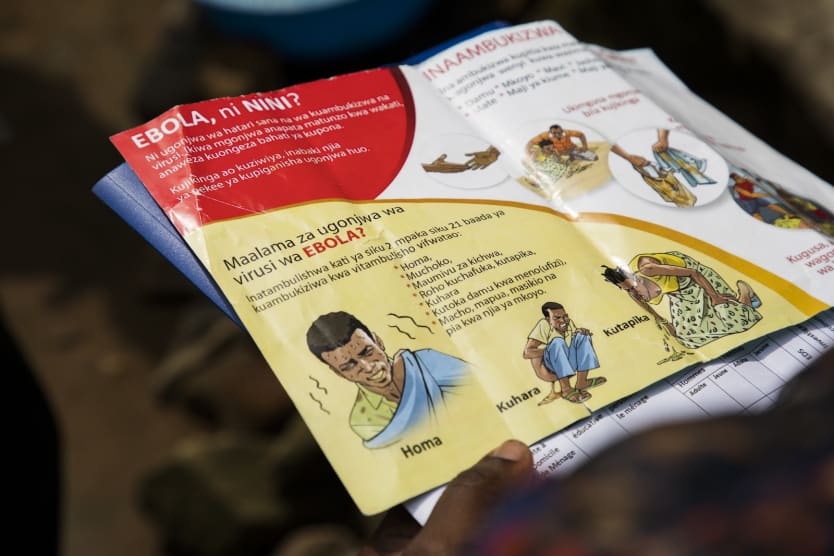Opinion: COVID-19 calls for disrupting the way we communicate in a crisis

Effective communication is the single most important factor in controlling COVID-19 — as every epidemiologist will tell you. Yet, as the disease continues to spread to some of the most marginalized communities on Earth, the humanitarian response is hitting a wall.
How do you say 'social distancing' in Swahili?
Around the world, translators are tasked with communicating emergency health advice that may have little meaning or relevance in a local context.
Responders simply aren’t communicating in the right languages and formats with people who need assistance. This is exacerbating inequalities and feelings of exclusion for some marginalized groups, such as asylum-seekers and people living in a country without legal permission.
From the Rohingya refugee crisis to northeastern Nigeria and the eastern Congo Ebola outbreak, I have spoken with both operational organizations and affected people about the recurring struggles with language barriers. In the coronavirus pandemic, I believe this communication problem needs urgent attention to ensure the response is as effective as we all need it to be.
Human translators have leaped into the breach with remarkable speed and commitment. Dozens of organizations and community groups have mobilized to get hand-washing posters and key messages translated. The linguists in the Translators without Borders community, for example, have already translated over 2 million words about COVID-19 into over 100 languages. But people alone can’t solve this problem.
It is time for disruption — for the entire humanitarian community to rethink the role of language and language technology. We must all invest in new language technologies if we want to generate real impact at speed.
It starts by challenging assumptions.
The first assumption is that COVID-19 information provided in official languages or “the nearest colonial language” is good enough to engage marginalized communities.
It is not.
Recent research in eastern Congo showed that language was a significant obstacle to controlling the 2018-20 Ebola outbreak. The early information, in French and Lingala, confused people about key aspects of Ebola and made them see the responders as part of the threat or Ebola as a weapon of war sent to kill them.
Women in particular said that they didn’t seek treatment because they feared misunderstanding and being misunderstood — and being misdiagnosed with Ebola as a result. One female resident of Beni — the epicenter of the outbreak — said that sick patients are often treated by medical personnel who only speak French, and if you do not understand each other, the trust is gone.
In many countries, if we stick to the official or dominant language for communication about COVID-19, we won’t reach large sections of society — especially the most vulnerable, such as women, older people, and people with disabilities. Clearly, communication in the languages affected people actually speak and understand is not just good humanitarian practice, it is vital to survival.
The second dangerous assumption is that language technology won’t work for marginalized language communities.
Experience has shown us that’s not true. Machine translation in local languages as a technology and as a service can be deployed rapidly in crisis situations. For example, in the aftermath of the 2010 earthquake in Haiti, a team from Microsoft, Stanford University, and Carnegie Mellon University developed a Haitian Creole machine translation engine from scratch in a matter of days. This helped critical, multilingual communication between responders and affected people.
Since then, language technology has made huge strides. A new project known as the Translation Initiative for COVID-19 is bringing together major research institutions and tech companies to boost building tools like machine translation and automatic speech recognition in as many languages as possible. This project will build on similar work being conducted by TWB since 2017 with Gamayun, the language equality initiative.
It is time for disruption — for the entire humanitarian community to rethink the role of language and language technology.
—And the best part: Language technology encourages two-way conversations, promoting accountability. It can help inform and engage communities.
This was the case of Translation Cards, an interagency project led by the United Nations Refugee Agency enabling real-time communication in different languages between refugees on the move in Europe and humanitarian personnel. Language technology can also help responders understand the real needs of the communities they are working in, as initial work with natural-language-processing applications for data collection demonstrates.
In an effort to tackle these challenges, TWB has developed a multilingual chatbot that can answer questions about COVID-19 in natural language conversations via text messaging apps. The chatbot collects any questions it doesn’t understand to inform responders about people’s needs and concerns — and to improve the chatbot.
The prototype — in Congolese Swahili, French, and Lingala — is being piloted in partnership with Red Cross and Red Crescent societies in Congo. We plan to expand to additional countries, which potentially include Bangladesh, Nigeria, Pakistan, Kenya, and Uganda.
These are just a few examples of how language technologies can amplify and accelerate the impact of humanitarian work. We need disruptive solutions that go to the heart of what we do: communicate with people in crisis. Having helped some of the world's biggest brands with multilingual communication for over 20 years, I am convinced that language technology can transform the way the humanitarian sector communicates.
The technology is here, waiting to be harnessed. All that is missing is the will.
Without doubt, every humanitarian response to COVID-19 will be held back by the inability to communicate and engage with language-marginalized communities. Multilingual, two-way communication enhanced by language technology is the answer.
Every government, donor, and organization involved in the response should adopt this approach if we’re to address the language barriers facing many vulnerable people. This is the very foundation of effective and accountable humanitarian action. It’s up to humanitarians to act on it.
Search for articles
Most Read
- 1
- 2
- 3
- 4
- 5








